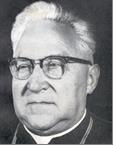Jakob Fried

Personalia
Born:
Died:
Profession:
Persecution:
Imprisonment 21.11.1939 - 27.02.1940,
Vienna Regional Court 27.02.1940 - 24.01.1941,
Regional Court Regensburg 24.01.1941 - 05.11.1943,
Vienna Regional Court 05.11.1943 - 24.11.1943,
Imprisonment 24.11.1943 - 23.05.1944,
then underground until the end of the war
Memberships
Curriculum Vitae
The son of a farmer from Lower Austria, Jakob Fried first attended grammar school in Nikolsburg [Mikulov] in southern Moravia and then the archbishop's boys' seminary in Hollabrunn. After graduating in 1905, he studied theology in Vienna and joined the student fraternity Amelungia in 1908.
After completing his studies, he was ordained a priest in 1909 and worked as a co-operator in pastoral care, first in Sitzendorf, Hollabrunn district, and then in St. Elisabeth in Vienna. In 1924 he was appointed curate of St. Stephan and rector of St. Ruprecht. After receiving papal honors in 1925 as Privy Chamberlain and in 1934 as Papal House Prelate, he was appointed to the Chapter of St. Stephen's in 1934, making him one of the most important political and economic decision-makers in the Archdiocese of Vienna.
From 1914, Jakob Fried was a member of the Austrian Catholic People's Association and later served as General Director and Diocesan President of the Catholic Youth Associations until 1938. He was the founder of the Reichsbund der katholischen deutschen Jugend Österreichs and initiated the Arbeitsgemeinschaft katholischer Jugendverbände in 1931. He is also one of the co-founders of the "Kleinen Volksblatt", later published as a party organ of the ÖVP, as well as the "Zwei-Groschen-Blattes" and is head of the "Wiener Kirchenblatt". He is a member of the CSP and the VF. As the author of numerous writings, he was a staunch opponent of National Socialism.
Immediately after the Anschluss, Jakob Fried had to endure several house searches. On 21 November 1939, he was arrested for allegedly being in contact with the monarchist resistance group "Müller-Thanner" and the Gruppe Burian. He was initially taken into protective custody at the Hotel Metropol, the Gestapo headquarters, until February 1940. Further stages of his imprisonment are: February 27, 1940-January 24, 1941 Landesgericht I in Vienna, then transferred to Regensburg to the regional court prison and back to Vienna on November 5, 1943.
At the trial on November 23/24, 1943, Jakob Fried is sentenced to three years' imprisonment by the 5th Senate of the VGH Vienna. At the trial on November 23/24, 1943, Jakob Fried was sentenced by the 5th Senate of the Vienna Criminal Court to two years in prison for "assisting in preparations for high treason" in accordance with Section 82 RStGB and for "not reporting criminal activities" in accordance with Section 139 RStGB. While in prison, he joins the student fraternity Ottonen. He is to be transferred to Dachau concentration camp, where he is to be put to death. This plan was not carried out because Jakob Fried was declared unfit for the camp with the help of two doctors. He was released on 23 May 1944 and exiled to northern Bohemia, where Großpriesen [Velke Bfezno] became his new place of residence from 14 June 1944.
He immediately became active again in the Group "O5" in the resistance. Jakob Fried went into hiding in Vienna-Hietzing from September 15, 1944 until the end of the war and was not allowed to exercise any public functions. Through the resistance movement, he came into contact with members of the student fraternity Pannonia, who awarded him their ribbon on 28 February 1946. He joined the ÖVP-Kameradschaft der politisch Verfolgten und Bekenner für Österreich in 1948.
After the war, he rebuilt the badly damaged parish church in Eibestal, Lower Austria, where he was also laid to rest.
Places
Place of activity:
Citations
- Krause, Peter/Reinelt, Herbert/Schmitt, Helmut (2020): Farbe tragen, Farbe bekennen. Katholische Korporierte in Widerstand und Verfolgung. Teil 2. Kuhl, Manfred (ÖVfStG, Wien), p. 78/79.
Prosl, Christian (2008): Tödliche Romantik. Das legitimistische akademische Corps "Ottonen" (Wien)
Matricula Online
